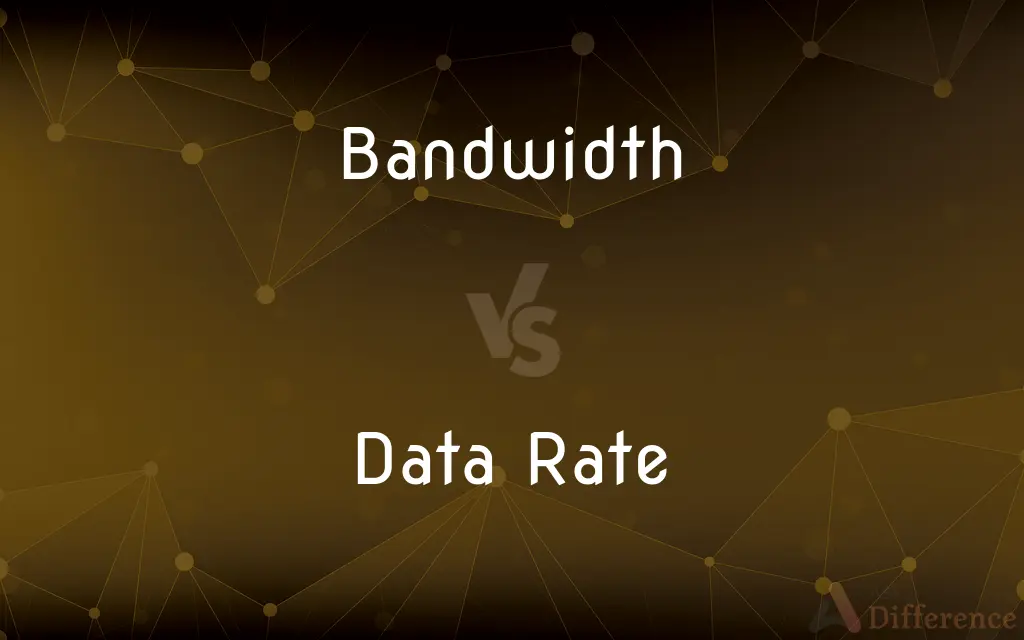Bandwidth vs. Data Rate — What's the Difference?
By Maham Liaqat & Fiza Rafique — Published on July 16, 2024
Bandwidth measures network capacity in Hz, indicating frequency range. Data rate measures actual data transmitted in bps, reflecting transmission speed.

Difference Between Bandwidth and Data Rate
Table of Contents
ADVERTISEMENT
Key Differences
Bandwidth is a term often used to describe the width of the frequency band over which a network can effectively transmit information. It's a measure of capacity, not speed, indicating how much data the network can handle at one time without considering the data's travel time. Whereas the data rate, or bit rate, specifically quantifies the speed at which data is transmitted from one point to another over the network, providing a direct measurement of the network's performance in transferring data.
In the context of digital communications, bandwidth is crucial because it sets the upper limit on the data rate that can be achieved. A higher bandwidth means a greater capacity to carry data, theoretically allowing for higher data rates. On the other hand, the data rate is influenced by various factors including the network's bandwidth, the quality of the transmission medium, and the protocols used, which can affect the efficiency of data transfer.
While bandwidth is a fixed property of a network, determined by its physical and technical characteristics, the data rate can vary widely depending on current network conditions, such as congestion and the presence of interference. Therefore, bandwidth represents potential capacity, while data rate shows actual usage and efficiency of data transmission at any given moment.
The distinction between bandwidth and data rate is essential in network design and management. For instance, a network with high bandwidth but experiencing high latency or errors may not achieve optimal data rates, highlighting the importance of considering both metrics when evaluating or improving network performance.
Both bandwidth and data rate are key metrics in understanding and optimizing the performance of digital networks. While bandwidth sets the theoretical maximum capacity for data transmission, the data rate reflects the practical speed at which data moves through the network, making them complementary aspects of network performance.
ADVERTISEMENT
Comparison Chart
Definition
Capacity of a network to transmit data within a unit of time
Actual amount of data transmitted over a network in a given time
Measurement Unit
Hertz (Hz)
Bits per second (bps)
Reflects
Range of frequencies a network can handle
Speed of data transmission
Determined By
Network's physical and technical characteristics
Network conditions, transmission medium quality, protocols
Importance
Sets the theoretical limit on data rate
Indicates the practical speed and efficiency of data transfer
Compare with Definitions
Bandwidth
The capacity of a network to carry information in a given time, measured in Hertz (Hz).
The bandwidth of the fiber-optic cable is high, allowing for more data to be transmitted simultaneously.
Data Rate
Reflects the actual throughput of a network, considering current conditions.
Network congestion can significantly reduce the data rate.
Bandwidth
Indicates the range of frequencies that can be transmitted without significant loss.
A wider bandwidth means the network can support high-quality video streaming.
Data Rate
Practical measure of network performance.
We monitor data rates to ensure our network meets performance standards.
Bandwidth
A fixed characteristic of a network, influenced by its infrastructure.
Upgrading network hardware can increase the bandwidth.
Data Rate
Directly impacts user experience by affecting loading and transfer times.
High data rates ensure smooth streaming of high-definition content.
Bandwidth
Essential for determining the potential data rate of a network.
To achieve faster internet speeds, we need to increase our bandwidth.
Data Rate
The speed at which data is transmitted over a network, measured in bits per second (bps).
The data rate of our internet connection is 100 Mbps, allowing for quick downloads.
Bandwidth
Related to the theoretical capacity of data transmission.
The system's bandwidth limits the maximum data rate we can achieve.
Data Rate
Can vary depending on network efficiency and conditions.
Improving signal quality can help achieve higher data rates.
Bandwidth
The numerical difference between the upper and lower frequencies of a band of electromagnetic radiation, especially an assigned range of radio frequencies.
Bandwidth
The width, usually measured in hertz, of a frequency band.
Bandwidth
The maximum rate of information transfer (measured in bits/second) that can be carried by a communication channel.
Bandwidth
A data transmission rate; the maximum amount of information (bits/second) that can be transmitted along a channel
Common Curiosities
How does Bandwidth affect Data Rate?
Bandwidth sets the theoretical maximum data rate of a network. A higher bandwidth allows for potentially higher data rates.
What is Data Rate?
Data rate, or bit rate, is the actual speed at which data is transmitted over a network, measured in bits per second (bps).
Why is Bandwidth measured in Hz while Data Rate is in bps?
Bandwidth is related to the range of frequencies a network can handle (a physical characteristic), whereas data rate measures the speed of data transfer (a performance metric).
Does increasing Bandwidth always improve Data Rate?
While increasing bandwidth can provide the capacity for higher data rates, actual data rates also depend on other factors like network congestion and transmission quality.
What is Bandwidth?
Bandwidth is the capacity of a network to transmit a certain amount of data in a specific unit of time, typically measured in Hertz (Hz).
How can I increase my network's Data Rate?
Improving data rate can involve increasing bandwidth, upgrading networking equipment, optimizing configurations, and reducing network traffic.
Can a network achieve its maximum Bandwidth in terms of Data Rate?
Achieving the maximum data rate up to the full bandwidth capacity is rare due to factors like network congestion, transmission medium quality, and communication protocols.
Is Data Rate the same as Internet Speed?
Yes, in the context of internet services, data rate is commonly referred to as internet speed, indicating how fast data is transmitted to and from the user.
What impacts Data Rate more than Bandwidth?
Factors like network congestion, signal quality, and protocol efficiency can significantly impact data rates, sometimes more than the available bandwidth.
Are Bandwidth and Data Rate important for all types of networks?
Yes, both metrics are crucial for understanding and optimizing the performance of any digital network, from small home networks to large enterprise and internet service providers.
Share Your Discovery

Previous Comparison
Volvo vs. Scania
Next Comparison
Sculpture vs. CeramicsAuthor Spotlight
Written by
Maham LiaqatCo-written by
Fiza RafiqueFiza Rafique is a skilled content writer at AskDifference.com, where she meticulously refines and enhances written pieces. Drawing from her vast editorial expertise, Fiza ensures clarity, accuracy, and precision in every article. Passionate about language, she continually seeks to elevate the quality of content for readers worldwide.














































